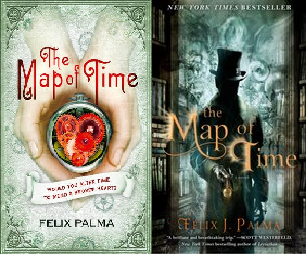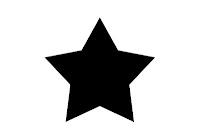Map of Time by Felix Palma
Published: 9th June, 2011
Publisher: Harper Collins Genre: Historical Fiction/Time Travel Format: Paperback
Pages: 528

Cover Art
I really like these covers. I have the one on the left and it attracted me to the book straight away. It has the steampunk vibe, and the intricacy of watches is always beautiful especially on book covers! I like the cover on the right too; I can never say no to a top hat and I feel it has a more Victorian feel which is appropriate seeing as this novel is set in the Victorian era.
Plot Synopsis
London, 1896. Andrew Harrington is young, wealthy and heartbroken. His lover Marie Kelly was murdered by Jack the Ripper and he longs to turn back the clock and save her.
Meanwhile, Claire Haggerty rails against the position of women in Victorian society. Forever being matched with men her family consider suitable, she yearns for a time when she can be free to love whom she choses.
But hidden in the attic of popular author – and noted scientific speculator – H.G. Wells is a machine that will change everything.
As their quests converge, it becomes clear that time is the problem – to escape it, to change it, might offer them the hope they need…
My Rating:
 First Line:
First Line:
Review'Andrew Harrington would gladly have died several times over if that meant not having to choose just one pistol from among his father's vast collection in the living-room cabinet.'
I think this book was written just to annoy me. I am sitting here with 5 pages of notes which I made whilst reading it that detail approximately one hundred reasons why I detested it from the first page to the last and why my boyfriend was forced to read some parts aloud to me because I became physically unable to finish it without assistance...my impulse to put it down was just too strong. But I did it. And now I am going to have to tell you why it is awful. This isn't going to be pretty. There will probably be spoilers but at least that will save you from the torture of actually reading it.
-Here are the Top Ten Reasons Why I Hated This Book-
1. Firstly, I HATED the narrator. He occasionally provides voice of God insights which persistently interferes with the story. It was utterly infuriating. When things were happening, this unexplained and un-bodied voice would come out of nowhere with such gems as, 'this part is very boring so I'll spare you the details...' No THAT was very boring and you should have spared me THAT. The voice is no-one. It is just the writer. Using a shoddy plot device to conceal bad writing. It doesn't work.2. Figures of speech and cliche are used constantly. Wrongly in most cases too. They are usually completely inappropriate considering the context they are used in and the phrases that are said were probably never used in Victorian times anyway. One the author loves is 'he felt a shiver down his spine'...I counted 6 uses of that alone. One is too many. Metaphors and similies are also employed pretty much every single paragraph, for example, 'the immense greenhouse was as graceful as a swan poised for flight'. HOW CAN A GREENHOUSE BE GRACEFUL?!
3. AM I SUPPOSED TO LIKE THESE CHARACTERS? They are horrible, shallow, awful people. The story kicks off with two cousins- Andrew and Charles- who are spoilt brat rich kids who whine about their parents. Charles is basically Lord Henry from 'A Picture of Dorian Gray'; he is decadent and smarmy but without the charm, wit and charisma that Lord Henry is imbued with. Andrew is spineless, pathetic and preposterously brooding. Apparently when he leaves the house he 'gazes at the moon for several minutes' and he 'watches a rose wilt in his hands'. Yeah those are really quotes. This is what I am dealing with. We are supposed to sympathise with these characters; people who regularly, by their own confession, go out and use women and are not ashamed in the slightest, in fact they find it highly amusing. I don't.
4. The characters (and author) are too aware that they are trying to portray Victorian times. No one, while living in the time that they live in, looks around and says things like 'Ah yes I and my surroundings are an example of my time...look at the rigid boundaries we Victorian people have and how strange the things we do are like wearing corsets and carrying parasols'. No one actually thinks like that at the time- you are submerged in your own culture and you think you are the pinnacle of civilisation; Victorians didn't think they were old-fashioned that is just us projecting and comparing our time onto theirs. This really, really irritated me as you were never submerged in Victorian times and there is absolutely no atmosphere whatsoever. The whole marketing of the book is centered on the Victorian aspect but it completely fails.
5. All of the references to historical figures from the Victorian era are so forced that it is cringey to read. It feels like the author just wrote about them with Wikipedia open and used the facts he found there to structure whole chapters. There is one chapter that is basically H.G Wells' autobiography; Wells just dumps huge chunks of explanation about his life and works like, 'this author wrote this book in this year, which I then read and then decided to write my book in this year on this day.' It's so unnecessary and feels completely amateurish
6. OK this is what REALLY got to me about this book; the portrayal of women. Wells cheats on his wife because, and get this, she is a mechanical, cold, baby-making machine who is 'unsuited to pleasure', so cheating on her is the answer to solve poor H.G Well's inability to have sex with her because of her incurable and unfair 'frigidity' (actual quotes). Yep he has 'solved it' by sleeping with another woman who he later leaves his wife for. AND WE ARE SUPPOSED TO SYMPATHISE WITH WELLS IN THIS INSTANCE. GAH!
His new wife, who asks visitors to tea, is described as showing 'the practical nature of her sex'. THANKS FOR THE COMPLIMENT FELIX PALMER. Nothing like an offensive mass generalisation of an entire gender to keep me reading.
Claire Haggerty, the main character in the middle section of the book, is described negatively as 'an impregnable fortress' and 'not of good breeding stock'. Yeah OK, the author has tried to make her seem like a liberated woman because she doesn't care for marriage and babies and is logical rather than silly, but then he is also saying she is the EXCEPTION. Most women are crazy baby-makers so let's find the one who isn't and write a book about her. Also, in one sentence she says that marriage is 'legal prostitution', and then in the next she is talking of, 'a romantic passion to which she longed to surrender herself.' And when she does have sex, she actually enjoys it (OMG WOMEN CAN ENJOY SEX) and this is considered by the men in the novel to be a miraculous event. Wells's wife barely omits a 'polite sigh' when he sexes her, so he obviously needs to leave the description of Claire's enjoyment of sex out on the counter for her so she can become more 'sexually liberated' you know...and scream and pull his hair and fake an orgasm probably. The problem can't be that he is rubbish in bed...noo it must be that his wife is frigid. Yeah makes sense.
Claire's sex scene is an abomination. It is a description of a low budget porn film in which the woman fakes it...but the author probably believes it's real. Claire is a virgin. She is TRICKED into losing her virginity to a man in a cheap guesthouse who she thinks is someone else and by the end of it she is a 'quivering wreck' because it is sooo pleasurable; she feels like 'a harp would when it's strings are plucked for the first time'. She screams, she hair pulls, she is in ecstasy. Because that is what losing your virginity is like. It is tender and you have an epiphany as to how much pleasure the human body can feel. YEAH THAT IS WHAT IT'S LIKE. Later on in the novel the guy who she slept with, thinking he was someone else, the guy who TRICKED her to get her into bed, goes back to her and there is no explanation. End of story. Soo...did she find out who he was? Is she angry that some guy tricked her into losing her virginity? That he got H.G Wells to write love letters for him and pretend he wrote them? We never know because apparently it doesn't matter. Apparently true love is so magical that none of that would matter to her...even though her love is based on absolutely NOTHING but lies. Women will do anything for love after all.
Another thing that bothered me about it was that later on, when reflecting upon it, the man in question refers to Claire's vagina as a 'terrifying entity' and, wait for it cause this is the worst and most horrible description I have ever heard of ANYTHING EVER, 'a sucking orifice'. Those are actually words written together in a novel that has been published.
This novel goes by the whole FALSE premise that Victorian women were scared of sex and frigid and everyone was much too prim and proper to discuss it. NOT TRUE. Just as in any society, sexuality was a huge business in the Victorian era. I hate this quote from Claire,
'In my own time, girls are brought up to repress their instincts, especially in well-to-do families like mine. Unfortunately, it is widely believed that the sole purpose of the sexual act should be procreation, and while men are allowed to express the pleasure they derive from physical contact...we women must show perfect indifference, as our enjoyment was considered immoral.'This is all wrong. This novel is set at the turn of the century...women were not seen like this at all in this period. They were seen more as ticking time bombs of lust that, once unleashed, was insatiable. It says so on Victorian Web, which I consider to be a reliable source. So there would be nothing strange about Claire's behavior after sex. I mean, has the author not read Dracula. Bram Stoker features in this novel yet it seems as though the author hasn't actually read it or he would know that women enjoying being penetrated, whether by fangs or penises, was not a new concept at this time. In fact, it was everywhere. Women enjoyed sex TOO much which is why they needed to remain chaste. After sex, Claire cannot love any other man, ever, as her love for the trikster is so strong and feverish and she will kill herself if she doesn't get a letter from him. Yep, where is your rational female character now?
Another female character, Lucy, is talked out of freaking KILLING SOMEONE because a policeman who fancies her says, 'don't stain your lovely little hands with blood' and she 'gazes up at him admiringly'. WHAT IS THIS SHIT.
7. The author is really, really inappropriately scathing about the appearance of the so-called 'Elephant Man' Joseph Merrick. The author goes on and on about what a 'hideously deformed creature' he is and how it makes one gasp and shudder and turn away to even lay eyes on him. I just found it really heartless and inconsiderate as there are a lot of people who have deformities and diseases which make them look different in some way and it seems appalling to write about disability in this way...making him seem inhuman and only worthy of pity. He was a person and should be written about as one not as some novelty in a book
8. Dialogue. Where is it? There is almost no dialog at all in this almost 600 page novel. This means that not only is is dull and tedious, it is also rubbish at characterisation and you never feel you know any of the characters in any way. For the whole of Chapter XIII there was no dialog whatsoever until the last line. Ridiculous. We are just TOLD that things happen but never actually see or hear them happening; there is no subtlety. We are not required to make up our own minds about characters based on evidence, but to just go along with whatever a snippet of a sentence tells us about them. One example; we are told in this chapter that Wells' wife's mother is a horrible person. We are told she reduces her daughter to 'a shivering wreck'. Do we meet this character? No. Is there any dialog featuring her at all? No. This happens constantly throughout this novel and I HATE IT.
In this chapter there is also a 2 page plot synopsis of The Time Machine by Wells. I didn't care for it. I didn't care for it at all.
9. After one of the characters believes he has time travelled, he describes that all he could smell was, 'singed butterflies'. GOOD. MAKES SENSE. WE'VE ALL SMELT THAT.
10. The time travel. Oh dear. It goes from real to false to real to false so it's hard to write about it clearly. All I do know is that it is complete bollocks that the whole of England (and the world) bought a story as flimsy as the one given in this book. So much so that they believe a tiny room is the whole of London and that there is nothing suspicious about traveling to the future in a train with blacked out windows.
A good thing about this novel is that the chapter are short, so when I told myself I couldn't continue reading I set myself goals to the end of chapters which meant I could finish it. So that was good. There is a quote in this book that reads, 'his writing was infantile and verbose in equal measure, the characters were poorly drawn and the dialog dull as dishwater.' This quote, referencing a bad novel given to Wells to review, sums up 'Map of Time' for me. Maybe I just didn't get it. Maybe this is a hilarious satire of Victorian novels and a pastiche that went so far over my head that it tricked me into thinking it was just terrible writing. Perhaps. But in my opinion that is no excuse for such a bore of a novel as this. Other Thoughts This Book has Inspired me to Read: It has made me never, ever want to read 'The Time Machine' by H.G Wells. Three Words to Describe this Book: Awful. Just awful.

